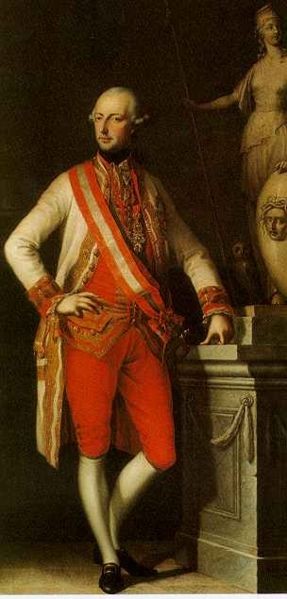Joseph II
Joseph II, b 13 March 1741 in Vienna, d 20 February 1790 in Vienna. (Portrait: Joseph II.) Emperor of the Holy Roman Empire (1765–90), which he ruled together with his mother Maria Theresa until 1780. During his rule, Austria annexed Galicia (1772) during the first partition of Poland and acquired Bukovyna (1774) from Turkey. Joseph concluded a formal alliance with Catherine II of Russia, forcing Austria to enter the Russo-Turkish War in 1788. An enlightened absolutist, he accelerated the reforms begun by Maria Theresa, which were aimed at strengthening the Habsburg Empire politically, economically, and militarily. Many of them benefited his Ukrainian subjects. To integrate Austria's multinational lands into a unitary state, a carefully controlled and centrally co-ordinated bureaucracy was put in charge of all branches of the administration and a police force with extensive powers was introduced. German became the official language in 1784 to facilitate the work of the central authority and to bind the empire. The Toleration Patent, which established religious equality before the law, was issued in 1781 in the belief that the loyalty of non-Catholics would thus be secured. To diminish the power of the Catholic church and raise revenue for the state, nearly 900 monasteries (including many Basilian ones) were dissolved in 1782; their properties were transformed into schools, philanthropic institutions, government buildings, army barracks, and even prisons. The priesthood was transformed into a civil service paid by the state (which dramatically improved the economic situation of the Greek Catholic clergy), bishops were deprived of much of their authority, and Greek Catholic priests received rights equal to those of the Roman clergy. Lviv University and the Greek Catholic Theological Seminary were opened in 1784, and the affiliated Studium Ruthenum for Ukrainian priests was founded in 1787. Joseph's agrarian legislation of the 1780s did much to improve conditions for the Ukrainian peasantry. Among his major reforms were the limitation of corvée labor on the seigneurial estates to three days a week, the regulation of other feudal rents, and the abolition of the status of personal dependence on the seigneur (Leibeigenschaft). Joseph encouraged new agricultural methods and the colonization of Galicia by Germans. Equality before the law was promoted by the regulation of criminal procedures, the introduction of new law courts and new codes of civil law (1786), and criminal law (1787); the latter abolished torture, the death penalty, and brutal punishments. Joseph's reforms caused widespread unrest and even revolt (in the Netherlands and Hungary), and many of them were repealed even before his death. However, they did break the all-powerful position of the Polish nobility in Galicia and stimulated the rise of a Ukrainian intelligentsia.
BIBLIOGRAPHY
Rosdolsky, R. Die grosse Steuer- und Agrarreform Josefs II: Ein Kapitel zur österreichischen Wirtschaftsgeschichte (Warsaw 1961)
Roman Senkus
[This article originally appeared in the Encyclopedia of Ukraine, vol. 2 (1989).]
